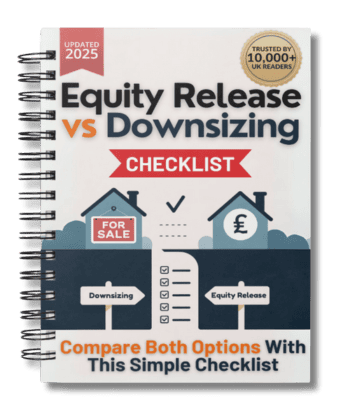
Nationwide Equity Release Review (2025): The Full Breakdown!
 Be aware. Equity release comes with drawbacks which are important to think about. Lifetime mortgages are secured loans. Compound interest means the amount you owe can grow quickly. Equity release reduces your estate's value and may impact means-tested benefits.
Be aware. Equity release comes with drawbacks which are important to think about. Lifetime mortgages are secured loans. Compound interest means the amount you owe can grow quickly. Equity release reduces your estate's value and may impact means-tested benefits.Key Takeaways
- Nationwide's equity release is closed to new customers but services existing plans.
- Rates range from 5.97% to 6.28% (AER) with a fixed-for-life structure.
- Alternatives like drawdown lifetime mortgages and RIOs offer new flexibility.
- Inheritance protection and no-negative-equity guarantee were standout features.
- Compare all options and seek FCA-regulated advice before proceeding.
In a climate of growing financial pressures and ageing demographics, equity release continues to be a crucial financial planning tool for homeowners aged 55 and over in the UK.
Nationwide Building Society, a household name and the world’s largest building society, historically provided compelling equity release products.
Although they have exited the new equity release market as of 2025, their legacy offerings and continued support for existing customers are still widely respected.
This comprehensive guide provides clarity on what Nationwide once offered, how it compares to today’s solutions, what support is still available for existing customers, and what other providers are picking up the torch.
Whether you're looking to switch, release more equity, or explore comparable products on the market today—this is your go-to resource.
Keep reading to uncover these valuable insights and secure your financial future...
NOTE: EveryInvestor is an impartial and unconnected third-party information provider via this website, and the details replicated in this commentary represent the opinions of EveryInvestor only and may not reflect the views or opinions of Nationwide. This article must not be interpreted as advice, nor is it a solicitation to conduct transactions in any financial product provided by Nationwide.
What Is Equity Release?
Equity release is a financial product designed to help homeowners aged 55+ unlock some of the tax-free cash tied up in the value of their property—without the need to downsize or sell.
There are two primary types:
Lifetime Mortgages: This is the most common. You take out a loan secured on your home, and the interest rolls up over time. You don’t make monthly repayments unless you choose to. Instead, the full amount (loan + interest) is repaid when you pass away or move into long-term care.
Home Reversion Plans: You sell a percentage of your home to a provider in exchange for a lump sum or regular payments. You continue living there rent-free for the rest of your life.
Want to dig deeper into the differences and costs? Check out our trusted equity release costs checklist.
Nationwide’s History in the Equity Release Market
Nationwide first entered the equity release space in 2017 with later-life lending options, including retirement interest-only (RIO) mortgages, standard capital-and-interest retirement mortgages, and their core lifetime mortgage product.
Their mission was to give homeowners a flexible retirement funding option without compromising the ownership of their home.
As a member-owned mutual, Nationwide focused on fair pricing, responsible lending, and customer-centric innovation—delivering equity release plans that addressed flexibility, inheritance protection, and regulated safeguards.
You can learn more about retirement planning options like retirement interest-only mortgages here.

Why Did Nationwide Withdraw Equity Release Products in 2025?
Nationwide halted equity release offerings to new customers, citing a mix of market volatility, changing customer behaviours, and rising interest rates.
Their 2022 pause coincided with the economic aftermath of the "mini-budget" that triggered mortgage chaos—resulting in higher funding costs and decreased affordability among retirees.
By 2025, customer demand had shifted toward more agile alternatives like group SIPPs or inheritance-friendly products. These changing dynamics caused Nationwide to refocus its retirement roadmap.
However, they continue to honour and support existing equity release customers—a key differentiator that highlights their commitment to members.
Nationwide’s Support for Existing Lifetime Mortgage Customers
Even as they exited the equity release market for new applicants, Nationwide still provides robust services and plan management for existing borrowers:
- Fixed-for-life interest rates: Safeguarding affordability through economic shifts
- Voluntary repayment flexibility: Up to 10% of the original loan annually without penalties (after 5 years)
- No Negative Equity Guarantee: Ensures your estate never owes more than the property’s value
- Option to switch plans: Move to more suitable products if available under Nationwide terms
- Inheritance protection clauses where applicable
For questions regarding releases or switching an existing Nationwide plan, please seek guidance through their customer line or branch advisors.
Nationwide’s Lifetime Mortgages: Key Features Explained
Lifetime mortgages are Nationwide’s flagship equity release product. Though no longer available for new applicants, these plans offered:
- Lump sum or drawdown flexibility
- No monthly repayments required
- Competitive fixed interest rates
- Inheritance protection features
- Early repayment options (with ERCs applied under specific terms)
They were designed for UK homeowners aged 55+, with a minimum qualifying property value.
How Much Can You Borrow? Loan-to-Value (LTV) Explained
Nationwide’s LTV limits increase with age. Here's a rough breakdown:
- At 55, you could borrow around 20%–25% of your home’s value
- At 70, your potential rises to 35%–40%
- At 85+, you might access up to 50% or more
Individual health and lifestyle factors could also enhance your loan size—sometimes known as enhanced lifetime mortgages.
For personalised illustrations, consult a professional adviser or use an equity release calculator.
Nationwide Equity Release Rates and Fees
As of the last available data, Nationwide's interest rates on equity release ranged between 5.97% - 6.28% AER (fixed). These rates are no longer updated but apply to existing plans under contract terms.
Typical Fees Included:
- Arrangement fee: Variable
- Legal fees: £600 – £1,000+
- Valuation fee: Often free (depending on property condition and value)
- Early Repayment Charges (ERCs): Variable, decreasing with time
Pro tip: Explore how these fees compare with today’s leaders in our top equity release companies in 2025.
Eligibility Rules for Nationwide Equity Release Plans
To have qualified for a Nationwide equity release, applicants had to:
- Be at least 55 years old and a UK resident
- Own a home worth at least £70,000
- Clear any existing mortgage upon completion
- Pass a property review for structural and valuation requirements
These rules continue to apply when managing existing plans. Eligibility to switch or release further funds is based on similar lending criteria and product terms.
Step-by-Step Nationwide Equity Release Application Process (For Reference)
For historical understanding, here’s how the application process worked:
- Initial Assessment: A free consultation to determine suitability
- Financial Advice: Advisors reviewed the customer’s needs
- Property Valuation: An independent survey assessed property value and condition
- Offer and Legal Advice: Customers received a personalised offer and legal assistance
- Release of Funds: Upon acceptances and legal completion
Although new applications are paused, this serves as helpful context when reviewing other providers with competitive processes.

Alternatives to Nationwide Equity Release in 2025
With Nationwide stepping back, many homeowners are exploring flexible and competitive alternatives:
- Drawdown Lifetime Mortgages: Access funds in smaller instalments as needed, reducing interest
- SIPPs: Use your pension more effectively through a Self-Invested Personal Pension
- Retirement Interest-Only Mortgages: Repay just the interest with full control over the principal
- Sell your home with equity release: Downsizing to access capital
- Family Loans and Gifting: Often interest-free and flexible for urgent needs
Inheritance Protection in Equity Release: What to Know
One of the key worries in equity release is its potential impact on your estate. Nationwide offered clients the ability to ring-fence a portion of their property’s value to leave behind.
This option, called inheritance protection, ensures that loved ones benefit from your property after your lifetime, despite the accumulation of compound interest.
Looking for more details? View our helpful guide on inheritance protection in equity release.
How to Compare Equity Release Providers: The Smart Investor’s Checklist
Not all providers offer the same rates, flexibilities, or protections. Use this checklist when comparing:
- Interest rates and lifetime costs
- Loan-to-value % and age-based limits
- Credit rating and complaints handling
- Range of plan features: drawdown, protection, early repayment
- Membership with Equity Release Council and FCA
Need help? Browse the latest top equity release lenders with real reviews.
How Does Nationwide Compare to Other Providers?
While Nationwide once offered strong customer service, fixed deals, and well-priced offerings, competitors like Aviva, One Family, Legal & General, and LV= currently provide a broader range of options.
Specialists like Ashfords or Papilio are increasingly popular for tailored plans and niche offerings.

Common Questions About Nationwide Equity Release, Answered
Yes. Existing clients can manage their plan, switch products if eligible, and request further funds under agreed terms.
You can usually port your plan to a new property, subject to property eligibility.
Yes, though early repayment charges may apply, especially in the first 5–15 years.
Yes, receiving release funds may impact your eligibility for means-tested benefits.
Nationwide is regulated by the FCA and PRA and has strict data protection processes.
Final Thoughts: Evaluating Nationwide’s Equity Release Plans in 2025
Nationwide’s reputation, regulatory record, and ethical commitments make it one of the most respected legacy providers. While they are no longer in the market for new clients, existing customers are well supported and may benefit from solid historic rates.
However, newer providers may offer more flexibility, modern features, and enhanced value. If you are actively considering releasing new funds, switching, or exploring newer protection features, check if another provider can unlock more capital or better suit your needs in 2025.
Disclaimer:
All details in this article were accurate as of July 2025. Rates, lending criteria, and eligibility rules may change over time. Please consult a financial adviser before making decisions based on this content.

Found an Error? Please report it here.





 100% private. No pressure. Just friendly guidance.
100% private. No pressure. Just friendly guidance.



